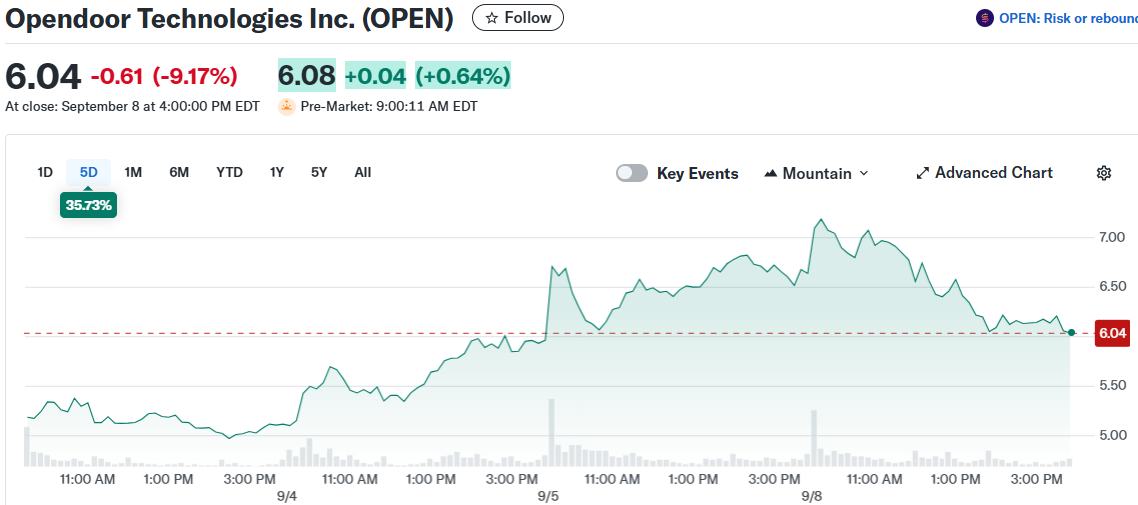TLDR
- OPEN stock jumped Monday morning after comedian Rob Schneider hinted at buying shares following social media buzz
- Interim CEO Shrisha Radhakrishna purchased 30,000 shares on August 28, though this news circulated Monday
- Social media campaign pushing for co-founder Keith Rabois’ return is driving trading volume with no confirmation from Rabois
- Stock has gained 170% over the past month and is up over 1200% from its 52-week low of 51 cents in June
- High short interest at 24% of float may be amplifying price movements through potential short squeezes
Opendoor Technologies stock experienced wild swings Monday as retail investors drove another day of meme stock behavior. The real estate technology company saw shares climb as much as 10% in morning trading before losing those gains and dropping 3.8% by midday.

The early morning surge came after weekend social media activity suggested comedian Rob Schneider would announce an investment in the company. Eric Jackson, leader of the self-described “OPEN Army,” teased Sunday evening that a celebrity comedian would support Opendoor Monday.
Jackson posted on X that it wouldn’t be Drake but hinted at another comedian making a buying announcement. Hours later, Rob Schneider quoted Jackson’s post with “Shhhhhhh… Let me BUY it FIRST!!!!”
Shhhhhhh…
Let me BUY it FIRST!!!! https://t.co/AysUo9Qvxc— Rob Schneider 🇺🇸 (@RobSchneider) September 8, 2025
Jackson followed up seemingly confirming Schneider as the mystery investor, writing “Ladies and germs… Welcome to the OPEN Army!!!” However, no official confirmation of any Schneider investment materialized.
The social media buzz added fuel to Opendoor’s recent surge among retail traders. Anthony Pompliano and other voices have been promoting the stock’s turnaround potential on various platforms.
Trading volumes Monday exceeded the stock’s 65-day average by midday. The heavy activity partly stemmed from reports about interim CEO Shrisha Radhakrishna purchasing 30,000 shares.
However, that purchase actually occurred on August 28, right after Radhakrishna was named temporary CEO following Carrie Wheeler’s departure. The timing of the news circulation created confusion about fresh buying activity.
Social Media Campaign Adds Pressure
Another factor driving Monday’s volatility was a weekend social media push calling for co-founder Keith Rabois to return to Opendoor. The campaign gained traction among retail traders but has received no response from Rabois himself.
There’s been no indication that Rabois would consider returning to the company he helped establish. The speculation appears driven entirely by online enthusiasm rather than any corporate developments.
Short interest may be amplifying the stock’s movements in both directions. As of mid-August, more than 24% of Opendoor’s outstanding shares were held by short sellers.
This high short interest level means any upward moves could trigger short squeezes. When shorts cover their positions, it creates additional buying pressure that can accelerate price increases.
Recent Performance Defies Fundamentals
The stock’s recent performance has been nothing short of dramatic. Opendoor shares have gained 170% over the past month alone.
From its 52-week low of 51 cents reached on June 26, the stock is now up more than 1200%. This massive rally has occurred despite ongoing business challenges.
The company’s iBuying model has struggled in the current housing market environment. High interest rates have dampened both buyer demand and seller activity across the real estate sector.
Market participants are betting that expected Federal Reserve interest rate cuts could improve conditions. Lower rates typically boost housing activity by making mortgages more affordable for buyers.
However, the recent stock movements appear disconnected from fundamental business performance. Retail traders have essentially turned Opendoor into a meme stock driven by social media sentiment rather than financial metrics.
The volatility Monday demonstrated why the stock remains risky for traditional investors. While traders may profit from short-term swings, the unpredictable nature makes it unsuitable for buy-and-hold strategies.
Opendoor’s business model involves buying homes directly from sellers, renovating them, and reselling to new buyers. The company aims to simplify real estate transactions but requires favorable market conditions to generate consistent profits.






